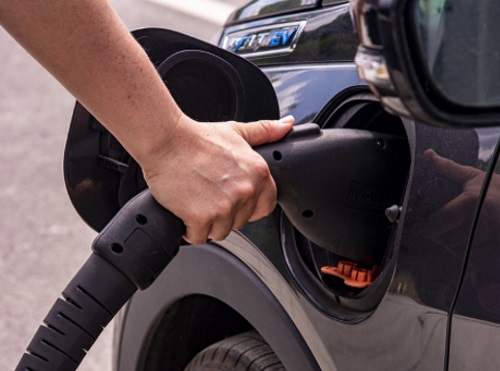The American Association of State Highway and Transportation Officials, the National Association of State Energy Officials, the U.S. Department of Transportation, and the U.S. Department of Energy signed a memorandum of understanding on February 23 to coordinate nationwide investment in electric vehicle charging station infrastructure.
[Above photo by the Ohio DOT]
A signing ceremony for the MOU will take place on March 1 at the AASHTO Transportation Policy Forum meeting as part of the organization’s 2022 Washington Briefing.
Jim Tymon, AASHTO’s executive director, explained in a statement that the MOU provides a “framework for collaboration” in response to the $5 billion National Electric Vehicle Infrastructure Formula Program established by USDOT and DOE on February 10 to build and operate a nationwide network of EV charging stations.
Funding for that new program comes from the $1.2 trillion Infrastructure Investment and Jobs Act or IIJA signed into law in November 2021.

“The focus on electric vehicle charging infrastructure across our national transportation network is a huge step to reducing greenhouse gas emissions, and we applauded the administration’s focus on this issue,” Tymon said.
“Many state departments of transportation have found success in their own EV charging infrastructure programs and know first-hand that collaboration between state energy offices and other agencies is instrumental to success,” he noted.
“This is a massive undertaking and this partnership will ensure all stakeholders are on the same page when it comes to challenges, concerns, best practices, and lessons learned,” he said.
[Editor’s note: Tymon delved more deeply into that topic at the NASEO 2022 Policy Outlook Conference held in Washington D.C. February 8-11 as part of panel discussion on the ways states and federal agencies can work together to support transportation electrification.]
The MOU states that AASHTO, NASEO, USDOT, and DOE will:
- Convene national, regional, state, local, tribal, and private sector actors to build capacity of EV charging station investments, foster coordination across a national network, advance common goals, and tackle shared challenges;
- Enhance coordination between state energy offices and state departments of transportation to leverage existing EV policies and programs with federal funding while also understanding the importance of private sector investment and engagement;
- Create a user-friendly, inclusive communications feedback loop between key state agencies and the federal government to ensure effective, coordinated, and timely EV charging planning and implementation;
- Identify data, technical, and programmatic assistance needs of states as they develop and implement state EV infrastructure deployment plans to maximize the effectiveness of IIJA programs; and
- Identify potential opportunities for federal EV charging investments to provide benefits to disadvantaged communities, facilitate job creation, and foster workforce development.
Many state DOTs are already pushing ahead with a variety of efforts to support current and future deployment of EVs.

In December 2021, the Oregon Department of Transportation issued future electrification needs study compiled in collaboration with local firm Forth, Kittelson & Associates and the Rocky Mountain Institute to detail Oregon’s EV charging needs over the next 15 years.
That study presented a “clear roadmap” for the agency and its partners for electrifying the state’s transportation system for multiple types of vehicles, Oregon DOT said.
In November 2021, Illinois Governor JB Pritzker (D) signed into law the Reimagining Electric Vehicles in Illinois Act into law to help “incentivize” EV production statewide.
That legislation builds upon the governor’s commitment to improving the state’s infrastructure by permitting the Illinois Department of Transportation to prioritize road projects that directly assist with locating an EV facility and the project’s infrastructure needs.
To provide a broader perspective of this issue, Shoshana Lew – executive director of the Colorado Department of Transportation – discussed the critical role state DOTs are playing in helping electrify the nation’s transportation system in an April 2021 episode of the Environmental Technical Assistance Program or ETAP Podcast.



